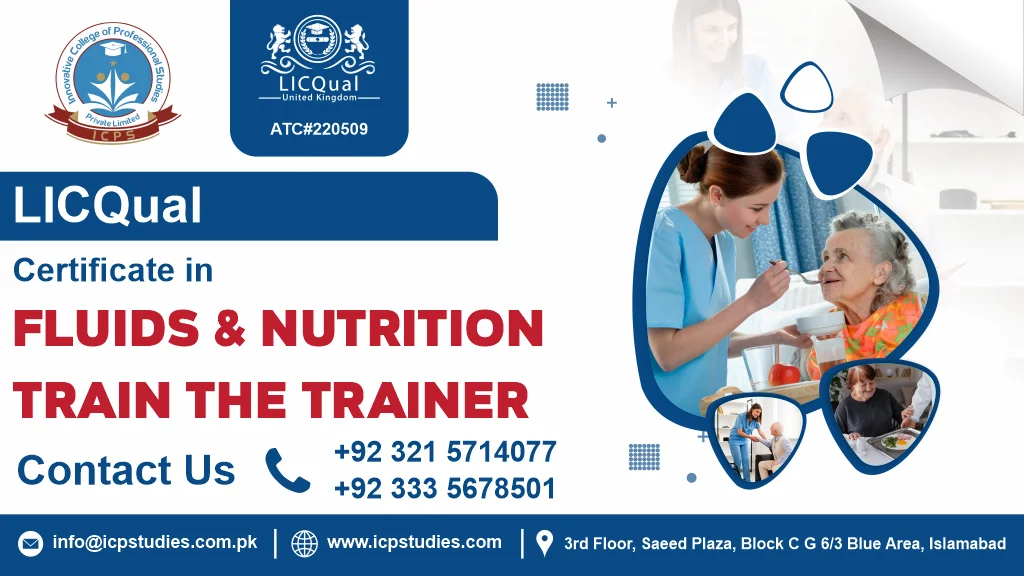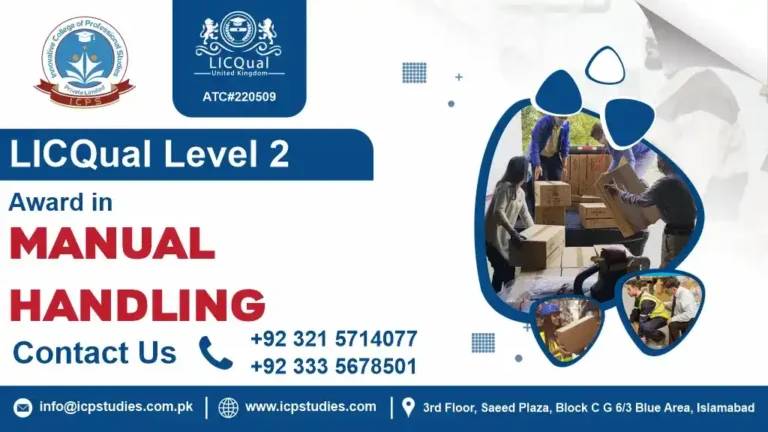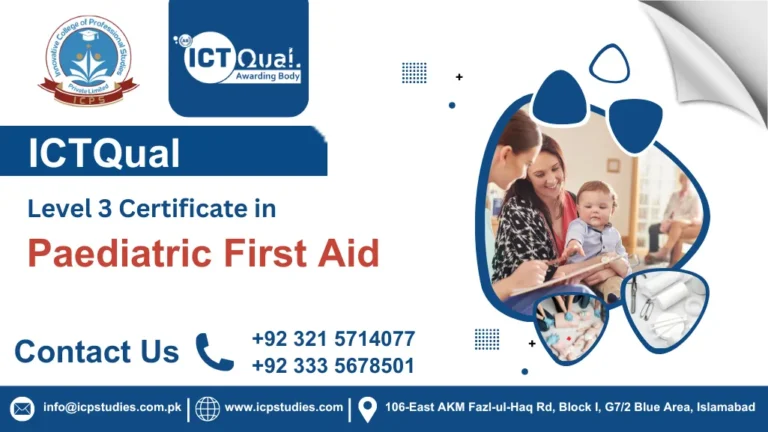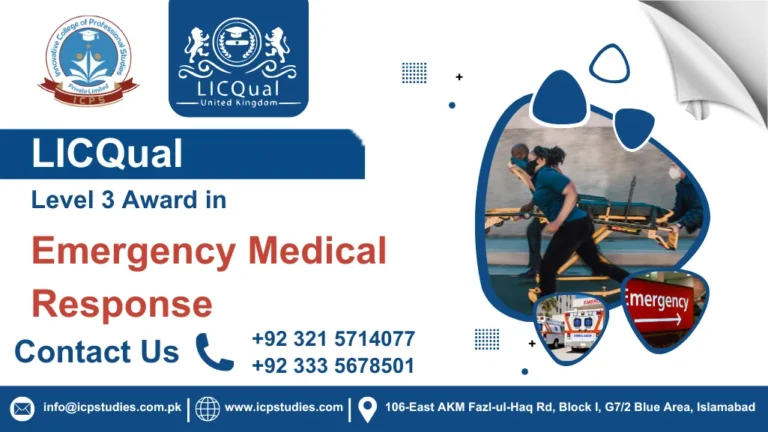In the dynamic field of healthcare and wellness, the importance of proper fluids and nutrition cannot be overstated. As professionals strive to deliver exceptional care and promote optimal health, the need for skilled trainers who can educate others on these critical topics becomes increasingly vital.
The LICQual Certificate in Fluids and Nutrition Train the Trainer is designed to equip you with the expertise to lead effective training programs and drive improvements in nutrition and hydration practices across various settings.
The LICQual Certificate in Fluids and Nutrition Train the Trainer is a specialized certification program aimed at developing advanced training skills in the areas of fluids and nutrition.
This course provides in-depth knowledge of nutritional principles, hydration strategies, and practical training techniques, empowering you to educate others effectively and enhance the quality of care provided in your organization.
The LICQual Certificate in Fluids and Nutrition Train the Trainer is more than just a certification—it’s a powerful tool for advancing your career and making a significant impact in the field of health and wellness.
By mastering advanced training techniques and gaining in-depth knowledge of fluids and nutrition, you’ll be well-equipped to lead effective training programs, promote optimal health, and enhance the quality of care in your organization.
Ready to elevate your expertise and drive positive change in nutrition and hydration practices? Explore the LICQual Certificate in Fluids and Nutrition Train the Trainer and discover how you can make a difference in the health and well-being of others.
For more information on enrollment and program details, contact us or visit our website. Empower yourself to lead with confidence and contribute to a healthier future.
All About Certificate in Fluids and Nutrition Train the Trainer
Course Overview
- The LICQual Certificate in Fluids and Nutrition Train the Trainer is a comprehensive program tailored for professionals aiming to specialize in educating others about the critical aspects of fluids and nutrition. This advanced certification provides in-depth training on how to effectively convey essential nutritional principles and hydration strategies to various audiences, ensuring that participants can lead impactful training sessions and improve health outcomes within their organizations.
- The course begins with a thorough exploration of fluids and nutrition fundamentals. Participants will gain a deep understanding of the essential components of a balanced diet, the role of hydration in maintaining health, and the impact of nutrition on overall well-being. This segment covers dietary guidelines, nutrient requirements, and fluid balance, providing a solid foundation upon which to build advanced training skills. By mastering these concepts, trainers will be able to deliver accurate, evidence-based information that supports optimal health and wellness.
- Following this, the program focuses on advanced training techniques and methodologies. Participants will learn how to design, develop, and deliver engaging training programs tailored to different learner needs. The course emphasizes the creation of compelling training materials, the use of various instructional methods, and the importance of interactive and participatory training approaches. These skills ensure that trainers can effectively communicate complex information and engage their audience in a meaningful way.
- A significant component of the course is dedicated to the assessment and evaluation of training effectiveness. Participants will acquire the skills needed to implement robust assessment tools, gather and analyze feedback, and make data-driven improvements to their training programs. This ensures that training sessions not only meet organizational goals but also effectively address the specific needs and learning styles of participants.
- The program also includes practical application through hands-on exercises and case studies. Participants will have the opportunity to apply theoretical knowledge to real-world scenarios, refining their training techniques and problem-solving skills. This practical experience helps to solidify learning and prepares trainers to handle common challenges encountered in health and nutrition training.
- In addition to technical skills, the course emphasizes the development of leadership and coaching abilities. Participants will learn how to provide constructive feedback, mentor trainees, and foster a culture of continuous improvement. These leadership skills are crucial for supporting the professional development of others and driving positive changes in nutrition and hydration practices within organizations.
- Upon completion of the LICQual Certificate in Fluids and Nutrition Train the Trainer, participants will be well-prepared to take on the role of a proficient trainer. They will possess the expertise to design and deliver effective training programs, ensure compliance with nutritional guidelines, and contribute significantly to improving health and safety standards. This certification not only enhances professional credibility but also empowers trainers to make a meaningful impact on the well-being of individuals and organizations.
Overall, the LICQual Certificate in Fluids and Nutrition Train the Trainer offers a robust framework for developing specialized training skills in the areas of nutrition and hydration. By combining theoretical knowledge with practical application, this program equips professionals to lead effective training sessions and promote optimal health outcomes.
Study Units
- Introduction to Fluids and Nutrition
- Understanding the Importance of Hydration
- Macronutrients and Micronutrients in a Balanced Diet
- Dietary Guidelines and Nutritional Recommendations
- Designing Engaging Training Content
- Effective Training Techniques for Fluids and Nutrition
- Addressing Dietary Needs for Different Age Groups
- Fluid and Nutrition for Special Health Conditions
- Handling Questions and Challenges during Training
- Evaluation and Improvement of Training Programs
Admission Criteria
To ensure that participants are well-prepared for the LICQual Certificate in Fluids and Nutrition Train the Trainer program and can fully benefit from the course, the following entry requirements are typically established:
1. Relevant Professional Experience:
- Candidates should have a minimum of 1-2 years of professional experience in a field related to health, nutrition, or wellness. This background provides a foundational understanding of nutritional principles and the importance of proper hydration, which will enhance the learning experience.
2. Educational Background:
- A relevant educational qualification is preferred. Candidates should ideally hold a diploma, degree, or equivalent certification in nutrition, dietetics, health sciences, or a related field. This ensures that participants have a solid academic foundation to engage with advanced training content effectively.
3. Experience in Training or Teaching Roles:
- While prior experience specifically in a training role is not always mandatory, candidates should demonstrate some experience in teaching, mentoring, or presenting information to groups. This experience helps in applying training techniques effectively and managing diverse learning environments.
4. Strong Communication Skills:
- Effective verbal and written communication skills are essential for delivering training content clearly and engagingly. Candidates should be able to articulate complex nutrition and hydration concepts in a manner that is accessible and understandable to various audiences.
5. Commitment to Professional Development:
- A demonstrated interest in professional growth and a commitment to enhancing one’s skills in nutrition and training are important. Candidates should show a willingness to advance their knowledge and contribute to the improvement of health and wellness practices.
6. Application Submission:
- Applicants may need to complete an application form and submit supporting documents, such as a resume or CV, a personal statement outlining their interest and experience, and, if applicable, letters of recommendation. This documentation helps assess the applicant’s suitability for the program.
7. Interview or Assessment (if applicable):
- Some programs may include an interview or assessment as part of the selection process. This step helps evaluate the applicant’s readiness for the course and their potential to benefit from and contribute to the training.
8. Technical Requirements for Online Learning:
- For online or hybrid course formats, candidates must have access to a computer with a reliable internet connection. Familiarity with basic digital tools and online learning platforms is also required to participate fully in the course.
Ideal Candidate
The LICQual Certificate in Fluids and Nutrition Train the Trainer is tailored for a diverse group of professionals who are involved in health, wellness, and educational roles. This certification is ideal for those looking to advance their expertise in training others about the crucial aspects of fluids and nutrition. The course is specifically designed for:
1. Healthcare Professionals:
- Dietitians and Nutritionists: Professionals in these roles can enhance their ability to educate clients and colleagues on optimal nutrition and hydration practices. This certification helps in delivering more effective and evidence-based training sessions.
- Nurses and Healthcare Providers: Those involved in patient care will benefit from advanced training techniques and a deeper understanding of nutritional needs and fluid management, enabling them to provide better patient education and support.
2. Wellness Coaches and Consultants:
- Wellness Coaches: Those guiding clients on lifestyle and dietary choices can expand their expertise to include training others in effective nutrition and hydration strategies. This certification provides the tools to create impactful wellness programs.
- Health Consultants: Consultants working with organizations to improve health practices will gain valuable skills to train and advise on nutrition and hydration, ensuring their recommendations are implemented effectively.
3. Fitness Trainers and Sports Coaches:
- Fitness Trainers: Trainers who wish to offer comprehensive advice on nutrition and hydration to complement fitness programs will find this certification beneficial. It equips them to educate clients on maintaining proper hydration and nutrition for optimal performance and recovery.
- Sports Coaches: Coaches looking to enhance their team’s performance through better nutrition and hydration strategies will benefit from advanced training skills and knowledge in these areas.
4. HR and Learning and Development Professionals:
- HR Managers: Those responsible for employee wellness programs can use this certification to develop and deliver training that promotes healthy eating and hydration practices within the workplace.
- Learning and Development Specialists: Professionals involved in creating training programs for various sectors can integrate nutrition and hydration topics into their offerings, enhancing the overall impact of their training initiatives.
5. Educational Professionals:
- Teachers and School Health Coordinators: Educators involved in student wellness and health education can use this certification to deliver comprehensive training on nutrition and hydration, contributing to better health outcomes for students.
6. Policy Makers and Health Advocates:
- Public Health Officials: Those working in public health can use this certification to design and implement community training programs focused on improving dietary practices and hydration.
- Health Advocates: Professionals advocating for better health practices can enhance their training capabilities, enabling them to effectively communicate the importance of proper nutrition and hydration.
7. Aspiring Trainers and Educators:
- New Trainers: Individuals aiming to enter the field of health and nutrition training will gain a solid foundation and recognized credential, preparing them to deliver effective training programs and advance their careers.
8. Industry Professionals in High-Risk Sectors:
- Hospitality and Food Service Managers: Those managing food service operations can use this certification to train staff on proper nutritional practices and hydration, ensuring that service standards meet health and safety regulations.
Learning Outcome
Upon completing the LICQual Certificate in Fluids and Nutrition Train the Trainer program, participants will achieve a range of key learning outcomes designed to enhance their ability to effectively train others on crucial topics related to fluids and nutrition. These outcomes include:
1. Comprehensive Understanding of Nutritional Principles:
- Gain In-Depth Knowledge: Develop a thorough understanding of essential nutritional principles, including dietary guidelines, nutrient requirements, and the role of different nutrients in maintaining health.
- Apply Nutritional Science: Learn how to apply nutritional science to create evidence-based recommendations and training content that promotes healthy eating and well-being.
2. Expertise in Hydration Strategies:
- Master Fluid Management: Acquire advanced knowledge of fluid balance, hydration strategies, and the impact of hydration on overall health and performance.
- Implement Hydration Practices: Learn how to integrate effective hydration practices into training programs and educate others on maintaining optimal fluid intake.
3. Advanced Training Design and Delivery Skills:
- Create Engaging Training Programs: Develop skills to design and deliver engaging, interactive training programs tailored to various audiences, including employees, clients, or students.
- Utilize Instructional Techniques: Learn advanced instructional techniques to effectively communicate complex nutritional and hydration concepts, ensuring content is accessible and impactful.
4. Proficiency in Training Assessment and Evaluation:
- Assess Training Effectiveness: Gain expertise in evaluating the effectiveness of training programs through various assessment methods and feedback mechanisms.
- Improve Training Outcomes: Use data-driven insights to continuously refine and enhance training content and delivery, ensuring alignment with organizational goals and learner needs.
5. Practical Application Through Case Studies and Simulations:
- Apply Knowledge Practically: Engage in hands-on exercises and case studies to apply theoretical knowledge to real-world scenarios, enhancing practical training skills and problem-solving abilities.
- Handle Real-World Challenges: Develop strategies for addressing common challenges and barriers encountered in nutrition and hydration training.
6. Enhanced Communication and Presentation Abilities:
- Effectively Communicate Concepts: Improve verbal and written communication skills to clearly and persuasively present information on fluids and nutrition.
- Engage Diverse Audiences: Learn techniques to engage and motivate different types of learners, ensuring that training sessions are effective and well-received.
7. Development of Leadership and Coaching Skills:
- Lead Training Sessions: Enhance your ability to lead and mentor others, providing constructive feedback and support to foster a culture of continuous learning and improvement.
- Promote Professional Development: Develop skills to coach and guide trainees in applying nutrition and hydration knowledge to their own roles or daily practices.
8. Capability to Develop Customized Training Programs:
- Design Tailored Training: Learn to create customized training programs that address specific organizational needs, health challenges, or learner requirements.
- Align with Organizational Goals: Ensure that training programs are aligned with organizational objectives and contribute to improving overall health and wellness outcomes.
9. Certification and Professional Recognition:
- Achieve Credentialing: Obtain a recognized certification that validates your expertise and competence in delivering fluids and nutrition training.
- Advance Career Opportunities: Enhance your professional credentials, positioning yourself as a qualified trainer in the field of nutrition and hydration.
FAQs about Certificate in Fluids and Nutrition Train the Trainer







